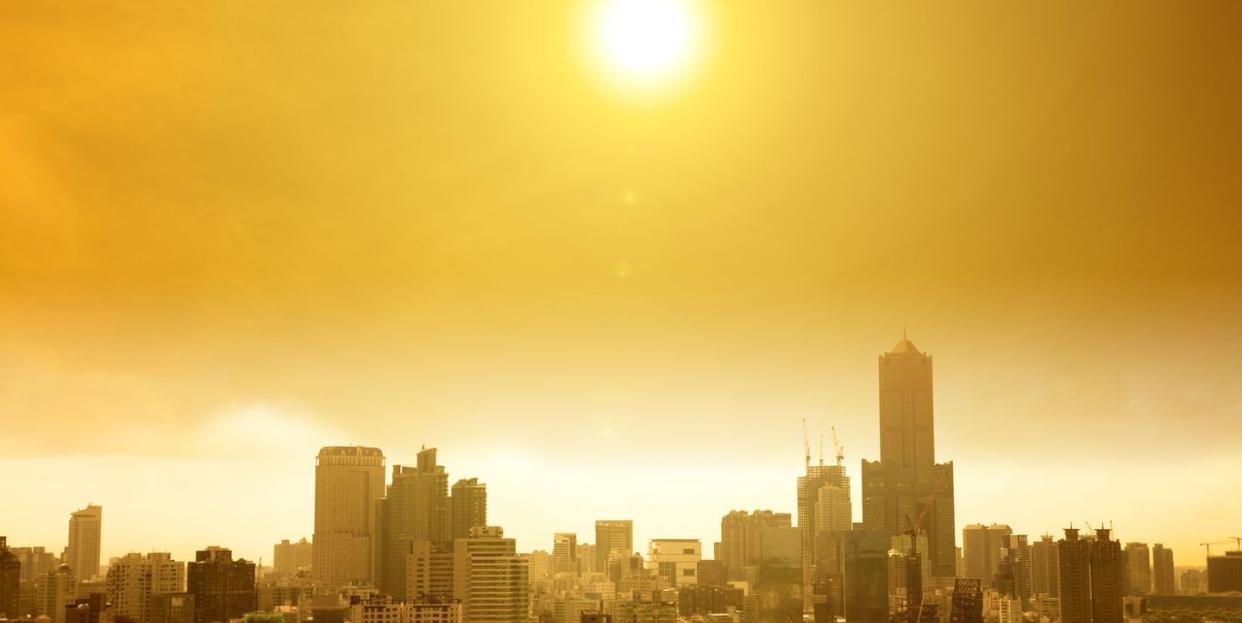A Dangerous Heat Wave Will Roast the Midwest and East Coast This Weekend

A dangerous heat wave will hit two-thirds of the U.S. through the weekend.
A large dome of high pressure will send temperatures into the 90s and 100s across most of the central and eastern U.S., according to the National Weather Service.
Doctors explain how extremely high temperatures can be dangerous, and what you can do to keep cool during a heat wave.
Summer and hot weather go together like PB&J, but there’s about to be some incredibly intense heat blanketing two-thirds of the U.S. through the weekend.
A large dome of high pressure will send temperatures into the 90s and 100s across most of the central and eastern U.S., with heat indices (how hot it feels) reaching up to 115 degrees in some places, according to the National Weather Service (NWS).
Many areas are expecting their hottest temperatures of the year through the weekend, NBC News reports. “There also will be no relief at night, as low temperatures remain in the upper 70s and 80s,” the National Weather Service (NWS) warned on its website.
Several major cities have already started making preparations. New York City officials, for example, have set up “cooling centers” that will stay in place through Sunday, the office of emergency management and health department said in a press release. Officials in Boston also just shared emergency tips and facts online for residents about how to prepare and stay safe in a heat wave.
You’ve heard that heat waves can be dangerous, but it’s understandable if you’re a little fuzzy on why that’s the case. Here’s what you need to know about keeping cool in the sweltering temps.
Why are heat waves dangerous?
When it’s really hot and humid out, your body has difficulty cooling itself off. And, when your body gets too hot to cool itself off properly or when you lose too much fluid or salt through dehydration or sweating, your body temperature rises, putting you at risk for a heat-related illness like heat exhaustion or heat stroke, says Eric Adkins, MD, vice chair of emergency medicine at The Ohio State University Wexner Medical Center.
“Producing and evaporating sweat cools and regulates our core temperature. But, when you add in extremely hot weather, humidity, and strenuous exercise, it becomes much more difficult for the sweat to evaporate and the body’s temperature can begin to rise past normal limits,” explains Bert Mandelbaum, MD, sports medicine specialist at Cedars-Sinai Kerlan-Jobe Institute in Los Angeles and team physician for US Soccer national teams. “In addition, profuse sweating without replenishing fluids will eventually deplete the body of necessary electrolytes.”
You can develop heat-related illness after that, which can be fatal, Dr. Mandelbaum says.
Who will be affected by this heat wave the most?
While everyone is impacted by excessive heat, young children, the elderly, people who have difficulty with mobility, and anyone with health problems tend to be most at risk of developing complications from it, Dr. Adkins says.
There are a few signs that the heat is impacting you more than just making you feel sweaty, and it’s important to be aware of them. “Knowing what to look for can help you resolve symptoms before they become life-threatening,” Dr. Mandelbaum says. He recommends taking action if you start to notice any of the following symptoms:
Thirst
Headaches
Dizziness
Faintness
Nausea
Chills
That means, get into the shade or an air-conditioned room, replenish liquids with electrolytes (water alone won’t be enough in these situations), and rest until the symptoms subside. “If it’s anything more serious, immediate cooling is always a good idea with ice packs, towels, or a cold water bath,” Dr. Mandelbaum says.
🚨 If you think someone is dealing with heat stroke, call 911—the situation can be life-threatening.
How to keep cool during the heat wave
There are a few things you can do to keep cool during the heat wave. The NWS recommends doing the following:
Reduce, eliminate, or reschedule strenuous activities until the coolest time of the day.
Wear lightweight, loose fitting, light-colored clothing to reflect heat.
Eat easy-to-digest foods like fruit or salads.
Drink plenty of water, and drink water even if you don’t feel thirsty. Focus on non-alcoholic and decaffeinated fluids, since alcohol and caffeine can dehydrate you.
Spend time in air conditioning.
Use electric fans.
Try to stay out of the sun.
Take cool baths or showers.
If you’re going to exercise outside during this time, Dr. Adkins recommends doing it in the early morning or at night when it’s cooler. But, if you can, it’s better to work out inside in air conditioning, he says.
What if your home does not have AC?
If your home does not have central air conditioning or a window unit, your best bet is to maintain air circulation using fans—but only if it is cooler inside than outdoors. If the inside of your home is higher than 95 degrees, using a fan might actually cause your body to gain heat, according to the New York State Department of Health.
If you’re starting to feel off in the heat wave, don’t hesitate to get into cooler temperatures, Dr. Adkins says. It’s definitely better to play it safe.
In this case, head to a local cooling center if your city has one (New York has this handy map, but official state government sites should point you in the right direction). If not, get to an air-conditioned space—like a friend’s home, the mall, or even a library—for at least a couple of hours. Be sure to close your windows and curtains to keep warm light out, drink plenty of water, take cool showers or baths, limit strenuous activity, and avoid using your oven or stove if possible.
You Might Also Like

